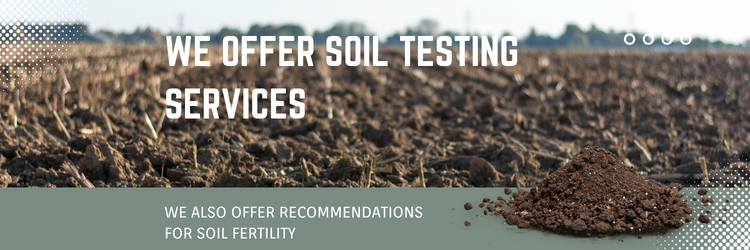
Happy Soil = Higher Yields
Importance of testing your soil when growing field corn
Growing field corn is a common farming practice around the world. The United States being one of the top corn producers. While corn is a hardy crop, growing in nutritious soil is important. This is where soil testing comes in.
Essential Nutrients
Soil testing is the process of analyzing soil samples. This determines the nutrient content and pH of the soil. This information is crucial. Testing determines the best course of action for amending the soil. Consider this the map for your soil health.
There are several key nutrients that are important for corn growth, including:
- nitrogen
- phosphorus
- potassium
Nitrogen is important for leaf growth and chlorophyll production. While phosphorus is essential for root development and energy intake. Potassium plays a role in water and nutrient uptake. It also helps with vigor of the plant.
In addition to major nutrients listed above, there are also several secondary nutrients. These micronutrients that are important for optimal corn growth. Testing the soil will reveal the levels of these nutrients. This allows farmers to add fertilizers or other amendments as needed. This ensures that their crops have access to all the nutrients they need.
Some of the micronutrients sometimes forgotten are Boron, Zinc and Iron.
Boron helps with carbohydrate transport, while zinc aids in enzyme activation. Iron helps with chlorophyll synthesis. While all of this may sound like 9th grade biology – it’s all important to how the plant grows and uptakes the nutrients it needs to flourish. Without a certain ingredient, you crop may not reach it’s full potential.
If you’ve never heard of Justus Von Liebig’s Law of the Minimum before, it states:
Basically, your yield is dictated by the nutrient that is most limiting.
Many times, this concept is illustrated as a bucket like this:

Soil pH is another important factor to consider when growing field corn. Corn prefers a slightly acidic soil, with a pH range of 6.0 to 6.8 being ideal. If the soil is too acidic or too alkaline, it can affect the availability of nutrients and the overall health of the plants.
Other Important Factors
Testing the soil before planting field corn is important for several reasons:
- It helps to optimize crop growth and yield: By ensuring that the soil has the right nutrient balance and pH, farmers can maximize the potential of their crops and increase yield.
- It can save money: By only adding the fertilizers and amendments that are actually needed. Growers can save money on needless inputs.
- It can protect the environment: Over-fertilizing or using the wrong types of fertilizers can have negative impacts on the environment. These can included water pollution and soil degradation. Soil testing helps farmers to apply the right amount of fertilizers and use the most appropriate types for their specific soil conditions.
Steps to Take in Soil Testing
- Collect soil samples: To get an accurate portrayal of the nutrient levels and pH of your soil, it is important to collect soil samples from multiple locations within your field. Aim for at least 15-20 samples per acre. Mix the samples together in a clean container.
- Dry the soil samples: Spread the soil samples out on a clean, dry surface and allow them to air dry for a few days. This will ensure that the moisture content of the soil does not affect the test results.
- Prepare the samples for testing: Once the soil is completely dry, it is time to prepare the samples for testing. This typically involves sifting the soil through a mesh screen to remove any debris, and then breaking up any clumps.
- Submit the samples to a laboratory: There are several options for testing your soil samples. You can either send them to a professional lab or use a testing kit to test the samples on your own. Many agricultural extension offices also offer soil testing services for a fee.
- Interpret the results: Once you have the test results back, it is important to interpret them correctly. The results will typically include information on the levels of various nutrients and the pH of the soil. Use this information to determine the best course of action for fertilizing and amending the soil to optimize crop growth.
The suggestion is to test your soil every 2-3 years. You can also test whenever you notice a change in crop growth or yield. This will help you to stay on top of any nutrient deficiencies or imbalances and ensure that your crops are getting the nourishment they need to thrive.
Overall, soil testing is an important step for growers looking maximize crop profit. Understanding the nutrient and pH levels of their soil allows farmers to make informed decisions about how to best nourish their crops and optimize their yield.
Revolution Soil and Seed provides soil testing services for our customers. We believe in helping our customers from the soil to the harvest. Reach out today to see how we can help you and your next growing season.
Our Promise
Provide reliable and knowledgeable service, while offering an innovative product lineup that boasts quality and affordability.Trust
We've planted it, harvested it, hauled it and fed it. Now we trust it enough to offer it to you.Our Core
We farm, we raise cattle, and we use the same products we sell.

